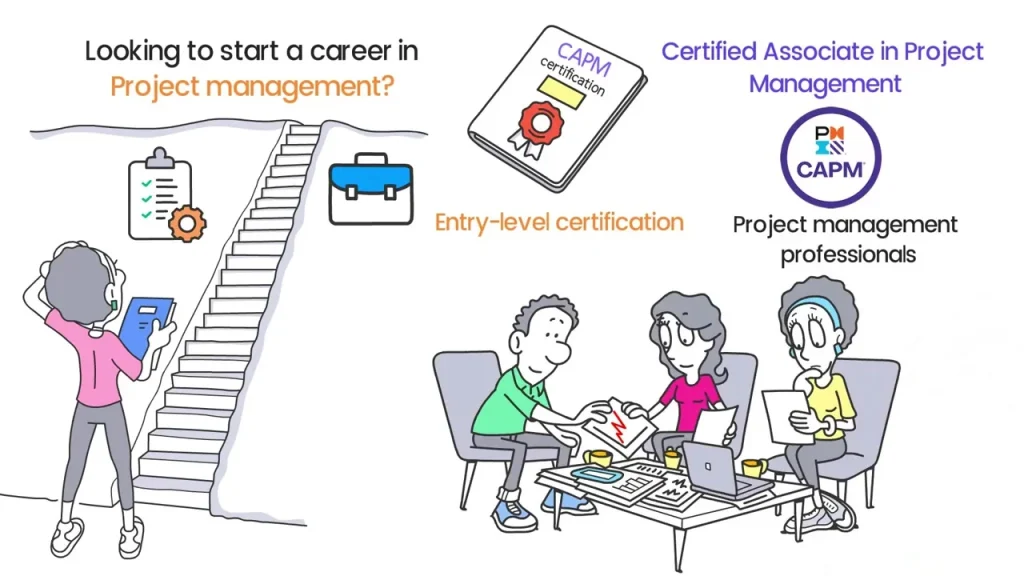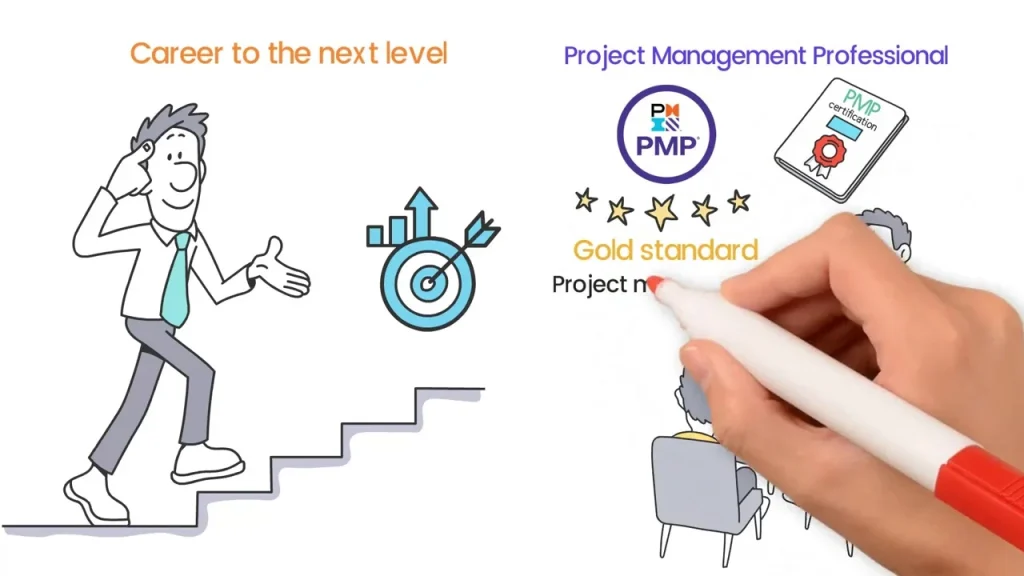In the dynamic field of project management, certifications from the Project Management Institute (PMI) serve as globally recognized benchmarks for professional competence. Two of the most prominent credentials are CAPM AND PMP:
- Certified Associate in Project Management (CAPM)
- Project Management Professional (PMP)
While both draw from PMI’s foundational guide, the Project Management Body of Knowledge (PMBOK Guide), they cater to different career stages:
- CAPM: Aspiring professionals building foundational knowledge
- PMP: For seasoned leaders applying advanced skills in real-world scenarios.
As of 2025, these certifications continue to boost employability, with PMP holders reporting up to 33% higher median salaries globally compared to non-certified peers.
What is CAPM?
The CAPM certification is designed for individuals new to project management. It validates foundational knowledge of principles, terminology, and processes. It’s ideal for team members, coordinators, or career changers seeking to demonstrate readiness for entry-level roles without prior experience.

Key Features and Benefits of CAPM
- Eligibility: Secondary degree and 23 hours of project management education or completion of the CAPM training.
- Focus: Emphasizes theory, basic processes, and predictive project management from the PMBOK Guide.
- Career Impact: Opens doors to roles like project coordinator or assistant project manager, with average U.S. salaries around $74,000–$80,000. It’s ranked #1 among in-demand certifications by Entrepreneur Media.
- Renewal: Every three years via 15 Professional Development Units (PDUs).
- Exam: 150 questions, taken over 3 hours.
CAPM acts as a stepping stone, fulfilling the 35-hour education prerequisite for PMP and laying a groundwork for agile or hybrid methodologies.
What is PMP?
The PMP certification is the gold standard for experienced project managers. It proves the ability to lead and direct projects across industries using predictive, agile, and hybrid approaches. It’s suited for those handling complex, high-stakes initiatives.

Key Features and Benefits of PMP
- Eligibility: Secondary degree, 60 months of project management experience, and 35 hours of education.
- Focus: Scenario-based application of PMBOK principles, including strategic alignment, risk management, and stakeholder engagement.
- Career Impact: Qualifies for senior roles like project manager or program lead, with average U.S. salaries exceeding $118,000—a 44% premium over uncertified professionals. Globally, it enhances credibility for international opportunities.
- Renewal: Every three years via 60 PDUs, encouraging continuous learning.
- Exam: 180 questions, taken over 230 minutes
PMP holders often report faster promotions and access to larger budgets, making it a career accelerator.
CAPM vs. PMP: A Side-by-Side Comparison
Here’s the breakdown of different aspects of CAPM and PMP:
| Features | CAMP | PAP |
| Target Audience | -Entry-level -No experience | -Experienced professionals -3–5 years |
| Eligibility | -Secondary degree -23 hours of PM education | -36 months experience + 35 hours education -60 months experience + 35 hours education |
| Cost | -Exam: $225 (member)/$300 (non-member) – Prep courses: $200–$500 | – Exam: $405 (member)/$575 (non-member) – Prep courses: $500–$2,000 |
| Exam Details | – 150 questions – 3 hours – Multiple-choice; theory-focused | – 180 questions – 230 minutes – Scenario-based; includes agile/hybrid |
| Salary Boost | +10–20% for entry roles (~$74K avg. U.S.) | +33–44% globally (~$118K avg. U.S.) |
| Difficulty | Easier; memorization-heavy, covers ~50% of PMBOK | More challenging; applied knowledge, full PMBOK integration |
| Focus | PM fundamentals, terminology, processes | Leadership, strategy, real-world project execution |
| Validity | 3 years; 15 PDUs for renewal | 3 years; 60 PDUs for renewal |
| Best For | Beginners, team members, students | Experienced project managers, leaders, consultants |
This table underscores CAPM’s accessibility for beginners versus PMP’s emphasis on proven expertise.
Similarities Between CAPM and PMP
Despite their differences, both certifications share core elements:
- Administered by PMI: Aligned with PMBOK and global standards.
- Exam Format: Computer-based, multiple-choice (with some drag-and-drop for PMP), offered via Pearson VUE.
- Preparation Overlap: Both benefit from PMI-authorized courses; CAPM prep counts toward PMP’s education requirement.
- Value Add: Enhance resumes, networking via PMI chapters, and job market edge—certified pros earn 20–25% more on average.
- Global Recognition: Valid in over 200 countries, supporting diverse industries like IT, construction, and healthcare.
These commonalities make transitioning from CAPM to PMP seamless for many.
Which One Should You Choose?
Your choice hinges on experience and goals:
- Opt for CAPM if: You’re starting out, lack project leadership hours, or need quick credibility. It’s a low-barrier entry that builds confidence and fulfills PMP prerequisites—perfect for recent grads or lateral movers.
- Go for PMP if: You have 3+ years directing projects and aim for leadership roles. It’s more rigorous but yields greater ROI in salary and advancement.
- Hybrid Path: Many start with CAPM (as noted in Reddit discussions) to gain foundational study habits before tackling PMP.
Conclusion
CAPM and PMP represent milestones in a thriving project management career, with CAPM igniting the spark and PMP fueling the fire. In 2025’s competitive landscape—where 88% of PMOs report certification as key to success—investing in either elevates your profile. Start with self-assessment, enroll in PMI-approved training, and commit to the exam. Whether coordinating your first team or steering enterprise initiatives, these credentials affirm your commitment to excellence. For official details, visit PMI.org and chart your course today.

